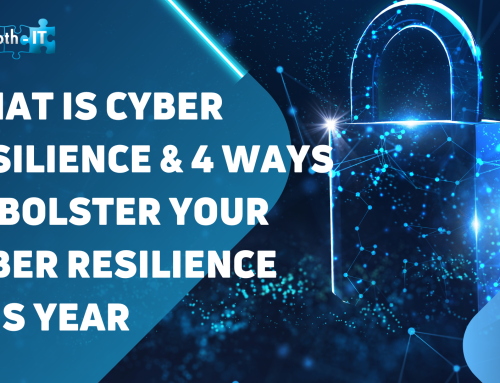If you’re a business owner, you’ve most likely heard the term DNS in meetings with your IT team or your managed service provider. How familiar are you with DNS? I’m here to help.
DNS stands for Domain Name System. It is a fundamental component of the internet infrastructure that translates domain names into numerical IP addresses. Small business owners should know the following about DNS and its importance:
Website Accessibility: DNS ensures that when customers type a domain name into their browsers, it is translated into the correct IP address, allowing them to access the business website. A reliable DNS system is crucial for website accessibility and user experience.
Email Delivery: DNS plays a role in email delivery by providing the information needed to route emails to the correct mail servers. Proper DNS configuration helps prevent email deliverability issues, ensuring that business emails reach their intended recipients. Several updates are coming from Gmail and Yahoo regarding emails and your DNS, which you can learn more about here.
Online Presence and Branding: DNS is essential for establishing and maintaining an online presence. Small businesses often rely on their websites as a primary point of contact with customers. A well-managed DNS system supports branding efforts and helps companies establish a professional online identity.
Security and Protection Against Cyber Threats: DNS is a critical layer of defense against cyber threats. Implementing DNS security measures, such as DNS filtering and threat intelligence, helps protect small businesses from malicious activities like phishing attacks, malware, and ransomware.
Domain Management: Small business owners need to manage their domain names, including updates, renewals, and changes. Understanding DNS is crucial for tasks such as domain registration, configuring subdomains, and making changes to DNS records to reflect updates in the business’s online infrastructure.
Website Performance: DNS resolution time impacts website loading speed. A well-optimized DNS system contributes to faster website performance, improving the user experience. For businesses, especially those with e-commerce platforms, a faster website can lead to increased customer satisfaction and conversions.
Reliability and Business Continuity: DNS redundancy and failover strategies contribute to business continuity. Small businesses should ensure that their DNS infrastructure is reliable and resilient to prevent downtime and maintain online services, even in the face of unexpected events.
Scaling IT Infrastructure: As small businesses grow, their IT infrastructure may need to scale. Understanding DNS is essential for managing the expansion of online services, adding new servers, and ensuring that the DNS system can accommodate the evolving needs of the business.
Compliance and Regulatory Requirements: Depending on the industry, there may be regulatory requirements related to DNS management and security. Small business owners should be aware of and compliant with any industry-specific regulations related to online presence and data security.
DNS is a foundational element of a small business’s online presence and communication. Business owners should care about DNS to ensure the reliability, security, and performance of their online services, contributing to a positive user experience and supporting the business’s overall success. Still need guidance? I’d love to help. Reach out to me here.




